 Wildfires push tropical forest destruction to 20-year high in 2024, just as EU delays anti-deforestation rules. In related news: the long shadow of of last summer’s Jasper wildfire; the downside of merging the US wildland firefighting agencies; and the wildfire evacuation order in Northwest Ontario is lifted. Meanwhile: BC Timber Sales pauses logging in caribou habitat; and Indigenous groups send eviction notice to Quebec forest companies.
Wildfires push tropical forest destruction to 20-year high in 2024, just as EU delays anti-deforestation rules. In related news: the long shadow of of last summer’s Jasper wildfire; the downside of merging the US wildland firefighting agencies; and the wildfire evacuation order in Northwest Ontario is lifted. Meanwhile: BC Timber Sales pauses logging in caribou habitat; and Indigenous groups send eviction notice to Quebec forest companies.
In Business news: Domtar nears decision on converting Quebec mill to containerboard; the US budget bill may cut funds for private forest owners; US single-family home size trends higher; the outlook for US housing and duties keep lumber prices volatile; and the Canadian Institute of Forestry’s Executive Director Mark Pearson is retiring.
Finally, both Swinerton and Mercer celebrate mass timber building completion milestones.
Kelly McCloskey, Tree Frog News Editor
 Based on last year’s success, the BC Forest Safety Council (BCFSC) is once again partnering with Tree Frog Forestry News to host Forest Safety Awareness Week, May 26 – 30. Each day will feature a series of articles highlighting safety in forestry with a focus on the importance of forest safety practices across the province and across Canada brought to you by Tree Frog News, BCFSC, and Tree Frog News sponsors.
Based on last year’s success, the BC Forest Safety Council (BCFSC) is once again partnering with Tree Frog Forestry News to host Forest Safety Awareness Week, May 26 – 30. Each day will feature a series of articles highlighting safety in forestry with a focus on the importance of forest safety practices across the province and across Canada brought to you by Tree Frog News, BCFSC, and Tree Frog News sponsors.

 Tariff uncertainty from the Trump administration continues to impact home builders across the country, as builders prepare for potential price hikes and supply chain issues. …Lumber remains a primary concern, with countervailing and antidumping duties expected to more than double this fall. Steve Martinez, president of Tradewinds General Contracting in Boise, Idaho, recently spoke with CNBC to emphasize just how much lumber goes into the construction of a new home. “This entire house is built out of wood,” Martinez said. “I mean, we really do have wood on the floor, wood on the walls, wood on the ceiling. Can’t really get away from building a house like this without using a large number of wood products in the home.” As a result, price increases to lumber can cause a huge disruption for home builders. And lack of certainty adds complexity to the home-building process.
Tariff uncertainty from the Trump administration continues to impact home builders across the country, as builders prepare for potential price hikes and supply chain issues. …Lumber remains a primary concern, with countervailing and antidumping duties expected to more than double this fall. Steve Martinez, president of Tradewinds General Contracting in Boise, Idaho, recently spoke with CNBC to emphasize just how much lumber goes into the construction of a new home. “This entire house is built out of wood,” Martinez said. “I mean, we really do have wood on the floor, wood on the walls, wood on the ceiling. Can’t really get away from building a house like this without using a large number of wood products in the home.” As a result, price increases to lumber can cause a huge disruption for home builders. And lack of certainty adds complexity to the home-building process.
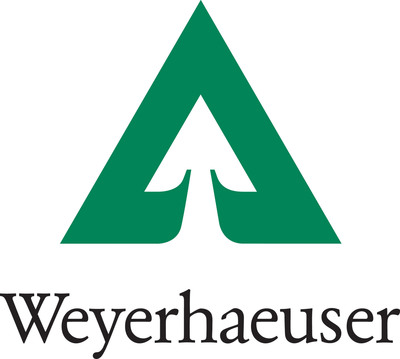



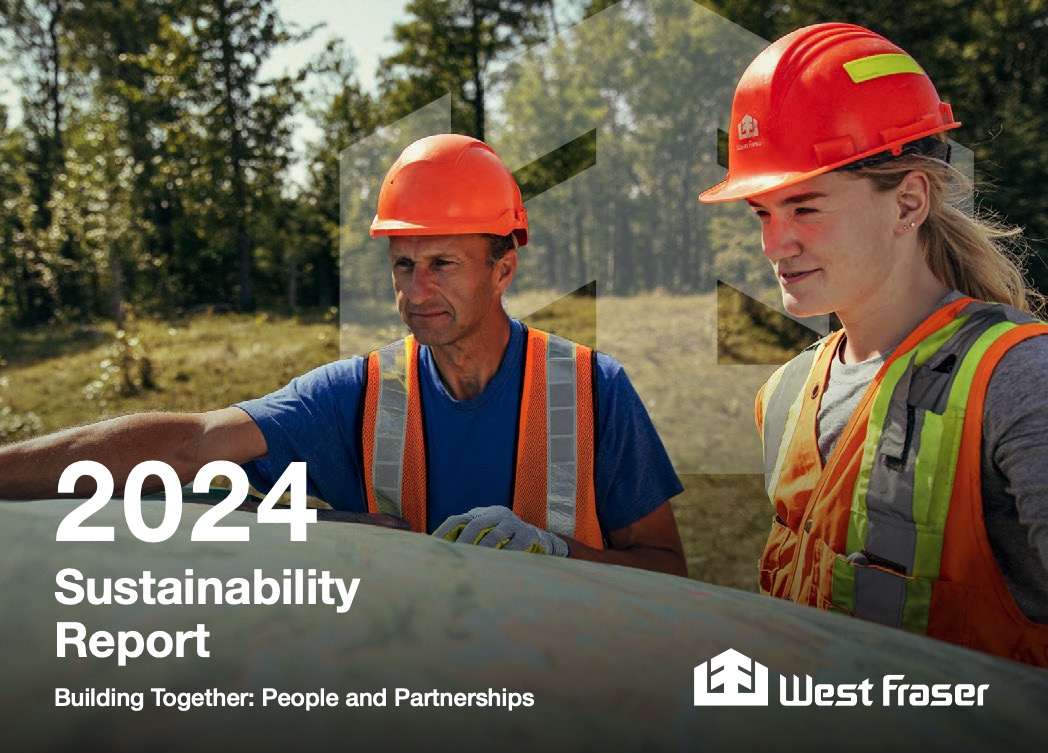 VANCOUVER, BC – West Fraser Timber Co. Ltd. released its 2024 Sustainability Report, Building Together: People and Partnerships. The report highlights the Company’s sustainability performance across a variety of environmental, social, and governance goals and disclosed targets. “Since our founding 70 years ago, West Fraser has recognized our responsibility to the environment and society while delivering solid financial performance,” said
VANCOUVER, BC – West Fraser Timber Co. Ltd. released its 2024 Sustainability Report, Building Together: People and Partnerships. The report highlights the Company’s sustainability performance across a variety of environmental, social, and governance goals and disclosed targets. “Since our founding 70 years ago, West Fraser has recognized our responsibility to the environment and society while delivering solid financial performance,” said  Culturally significant land in the Cowichan Valley has been returned to Lyackson First Nation and Cowichan Tribes communities, a reconciliation landmark between the Nations and B.C. The lands that are now in possession of the Nations are near an existing Cowichan Tribes Indian Reserve known as Skutz Falls IR8 and adds to an area that has historically been used by the Nations for gathering, harvesting and other activities of cultural importance for their communities. “The acquisition of this parcel of land could not have been made possible without the commitment of British Columbia, our kinship ties with Cowichan Tribes and willing seller Mosaic,” said Hereditary Chief Laxele’wuts’aat Chief Shana Thomas of Lyackson First Nation.
Culturally significant land in the Cowichan Valley has been returned to Lyackson First Nation and Cowichan Tribes communities, a reconciliation landmark between the Nations and B.C. The lands that are now in possession of the Nations are near an existing Cowichan Tribes Indian Reserve known as Skutz Falls IR8 and adds to an area that has historically been used by the Nations for gathering, harvesting and other activities of cultural importance for their communities. “The acquisition of this parcel of land could not have been made possible without the commitment of British Columbia, our kinship ties with Cowichan Tribes and willing seller Mosaic,” said Hereditary Chief Laxele’wuts’aat Chief Shana Thomas of Lyackson First Nation. 
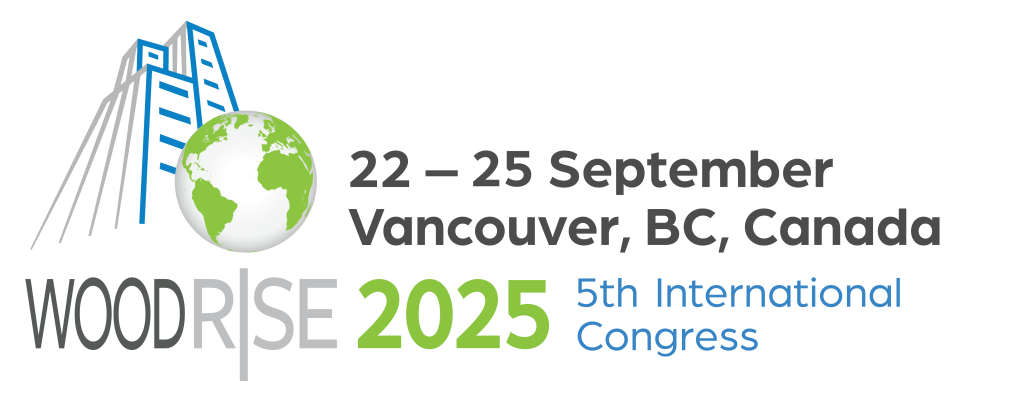
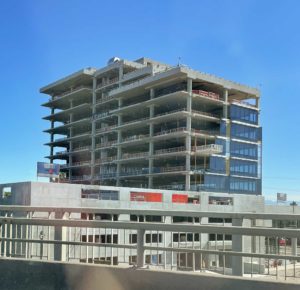 The new Cowichan District Hospital will be British Columbia’s first fossil fuel-free hospital, Island Health announced on Earth Day, April 22. The new hospital is under construction on Bell McKinnon Road near Duncan on Vancouver Island and is scheduled to open in 2027. It is also Canada’s first hospital to achieve Zero Carbon Building – Design certification from the Canada Green Building Council. “We’re building hospitals that will care for people in our communities for generations,” said Bowinn Ma, B.C.’s minister of Infrastructure. “This certification shows that through innovative design, we can create hospitals that support the well-being of families and a sustainable future.”.. The hospital’s leading-edge sustainability measures will free up resources for patient care while supporting patient and staff well-being and delivering environmental benefits.
The new Cowichan District Hospital will be British Columbia’s first fossil fuel-free hospital, Island Health announced on Earth Day, April 22. The new hospital is under construction on Bell McKinnon Road near Duncan on Vancouver Island and is scheduled to open in 2027. It is also Canada’s first hospital to achieve Zero Carbon Building – Design certification from the Canada Green Building Council. “We’re building hospitals that will care for people in our communities for generations,” said Bowinn Ma, B.C.’s minister of Infrastructure. “This certification shows that through innovative design, we can create hospitals that support the well-being of families and a sustainable future.”.. The hospital’s leading-edge sustainability measures will free up resources for patient care while supporting patient and staff well-being and delivering environmental benefits.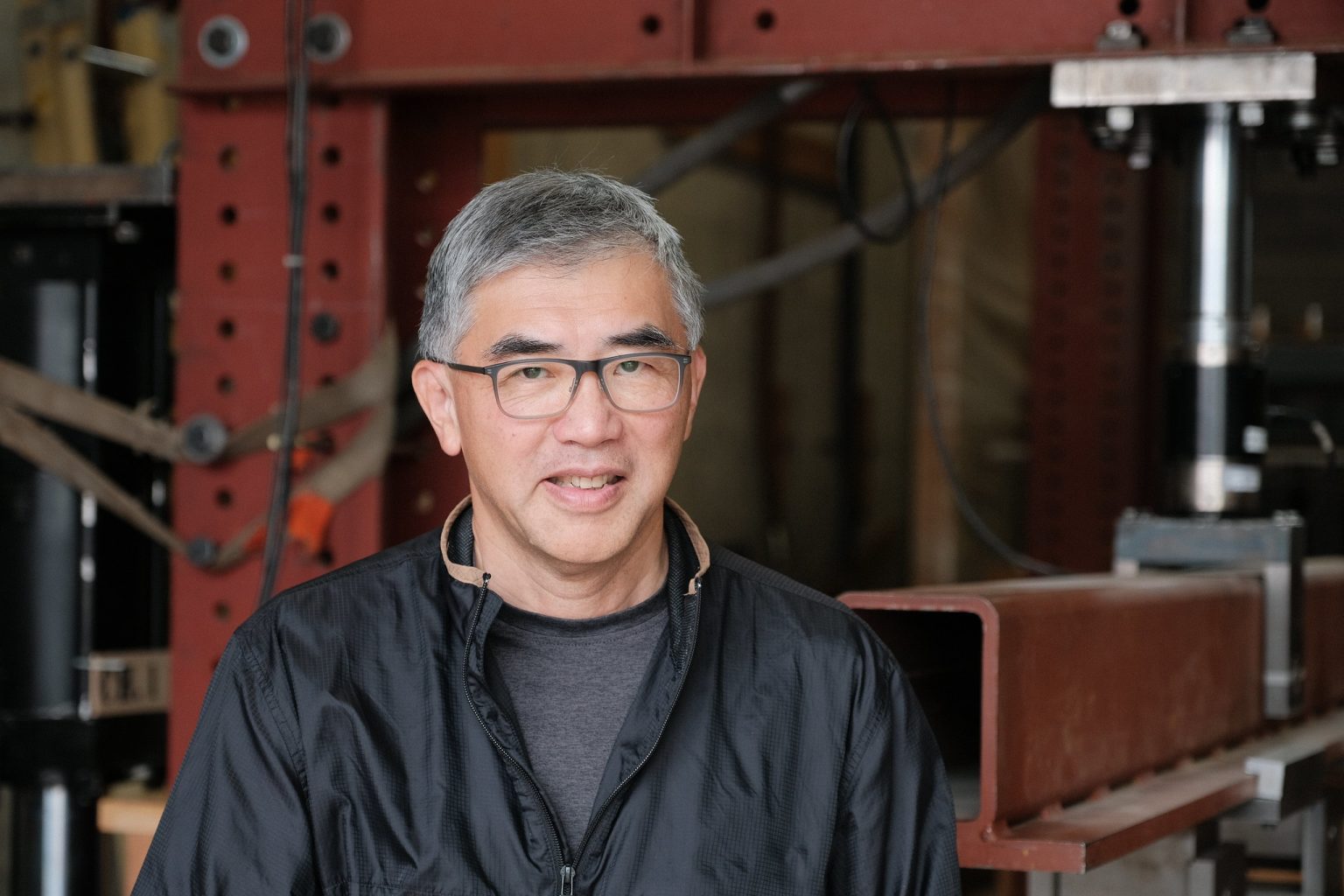
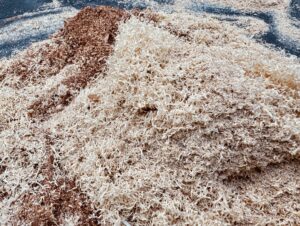 The adage that one person’s waste is another’s treasure was proved true on Wednesday, May 21, when the province announced millions in investments in forestry biomass. Forestry biomass refers to forestry by-products that are not used in traditional wood-processing industries like sawing, veneering and pulp and paper. Examples include: crowns, branches, bark, sawdust, wood shavings, and wood chips. It is used in everything from food additives to building materials. It also has many emerging uses, including renewable natural gas, bioplastics and hydrogen, considered to be responsible alternatives to carbon-intensive products. The government says their aim is to protect workers and jobs in the forestry sector… The program has invested up to $20 million each year in projects to increase wood harvest, create forest sector opportunity and find new uses for wood in collaboration with stakeholders, industry and Indigenous communities. Find the press release
The adage that one person’s waste is another’s treasure was proved true on Wednesday, May 21, when the province announced millions in investments in forestry biomass. Forestry biomass refers to forestry by-products that are not used in traditional wood-processing industries like sawing, veneering and pulp and paper. Examples include: crowns, branches, bark, sawdust, wood shavings, and wood chips. It is used in everything from food additives to building materials. It also has many emerging uses, including renewable natural gas, bioplastics and hydrogen, considered to be responsible alternatives to carbon-intensive products. The government says their aim is to protect workers and jobs in the forestry sector… The program has invested up to $20 million each year in projects to increase wood harvest, create forest sector opportunity and find new uses for wood in collaboration with stakeholders, industry and Indigenous communities. Find the press release 




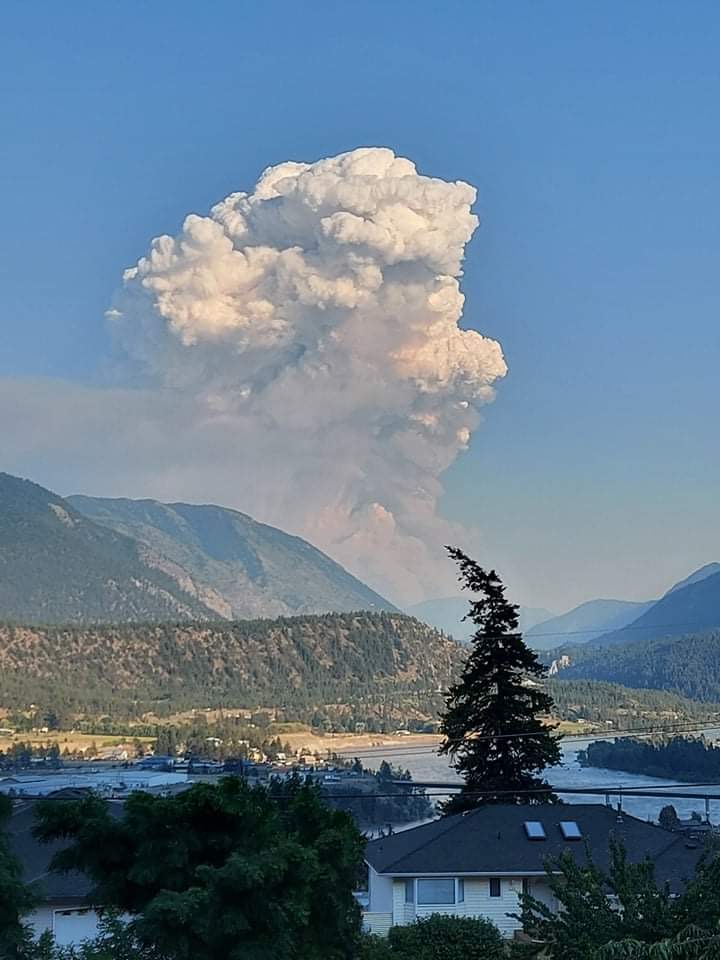 With drought and tinder dry conditions hitting many parts of the province, a number of municipal mayors are raising concerns about yet another potentially record-breaking wildfire season in B.C. Clearwater Mayor Merlin Blackwell, who has seen flames dance around his community for years, says current temperatures are well above normal. “We are in drought conditions up here. We are expecting an above normal, higher risk wildfire season for sure,” he said. …Mayor Barbara Roden has lived in Ashcroft for 28 years. She says, given the fire seasons in the last several years, fear now hangs over residents. …she says the increasingly extreme heat facing this province year after year is also becoming an equally serious concern. A sentiment understood and echoed by Lytton Mayor Denise O’Connor. She moved back to her family home not that long ago after the village was leveled by a massive wildfire during the 2021 heat dome.
With drought and tinder dry conditions hitting many parts of the province, a number of municipal mayors are raising concerns about yet another potentially record-breaking wildfire season in B.C. Clearwater Mayor Merlin Blackwell, who has seen flames dance around his community for years, says current temperatures are well above normal. “We are in drought conditions up here. We are expecting an above normal, higher risk wildfire season for sure,” he said. …Mayor Barbara Roden has lived in Ashcroft for 28 years. She says, given the fire seasons in the last several years, fear now hangs over residents. …she says the increasingly extreme heat facing this province year after year is also becoming an equally serious concern. A sentiment understood and echoed by Lytton Mayor Denise O’Connor. She moved back to her family home not that long ago after the village was leveled by a massive wildfire during the 2021 heat dome.
 It doesn’t look like much from the grid road. Just an approach with deep tire ruts chewed into the summer Saskatchewan mud, tall jack pine and spruce trees clustered at its opening like a gateway. But if you walk past that first line of trees and down the narrow working trail, it fans out into a pocket of open space. Scattered there are stumps, piles of dirt and roughage, logs that are too small or too large stacked to the side — the aftermath of a logging sweep, both bare and messy. That pocket opens further into a clearing, a few hundred acres in size, that was logged the spring before. Grass now pokes through the churned-up dirt; grasshoppers chirp in the still July heat. Across the clearing, even if you can’t see it through the trees that dot the far side, is the northern town of Big River, Sask. It’s just a few hundred metres away.
It doesn’t look like much from the grid road. Just an approach with deep tire ruts chewed into the summer Saskatchewan mud, tall jack pine and spruce trees clustered at its opening like a gateway. But if you walk past that first line of trees and down the narrow working trail, it fans out into a pocket of open space. Scattered there are stumps, piles of dirt and roughage, logs that are too small or too large stacked to the side — the aftermath of a logging sweep, both bare and messy. That pocket opens further into a clearing, a few hundred acres in size, that was logged the spring before. Grass now pokes through the churned-up dirt; grasshoppers chirp in the still July heat. Across the clearing, even if you can’t see it through the trees that dot the far side, is the northern town of Big River, Sask. It’s just a few hundred metres away.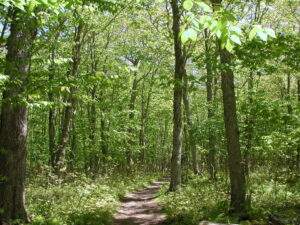 When outdoor enthusiasts Jeff Woodgate, Shaun Peter and Joey Reinhardt learned of West Fraser Timber Cochrane’s plans to harvest parts of their beloved forests near Moose Mountain and West Bragg Creek, they didn’t sit back. Fueled by a deep connection to the land and a sense of urgency, the trio founded Guardians of Recreational Outdoor Wilderness (GROW) and launched a petition to cancel the logging plans. Their message struck a chord. Today, more than 20,000 people have signed in support of preserving these cherished landscapes… After listening to public concerns, West Fraser reduced the scope of its plan by 37 per cent, now targeting 556 hectares — 268 in West Bragg Creek and 288 in Moose Mountain. According to West Fraser, the revised plan will now affect only five of 26 trails, with just 2.1 km directly impacted. Another 18.3 km of trail — about 17 per cent of the network — falls within 50 metres of harvest areas.
When outdoor enthusiasts Jeff Woodgate, Shaun Peter and Joey Reinhardt learned of West Fraser Timber Cochrane’s plans to harvest parts of their beloved forests near Moose Mountain and West Bragg Creek, they didn’t sit back. Fueled by a deep connection to the land and a sense of urgency, the trio founded Guardians of Recreational Outdoor Wilderness (GROW) and launched a petition to cancel the logging plans. Their message struck a chord. Today, more than 20,000 people have signed in support of preserving these cherished landscapes… After listening to public concerns, West Fraser reduced the scope of its plan by 37 per cent, now targeting 556 hectares — 268 in West Bragg Creek and 288 in Moose Mountain. According to West Fraser, the revised plan will now affect only five of 26 trails, with just 2.1 km directly impacted. Another 18.3 km of trail — about 17 per cent of the network — falls within 50 metres of harvest areas.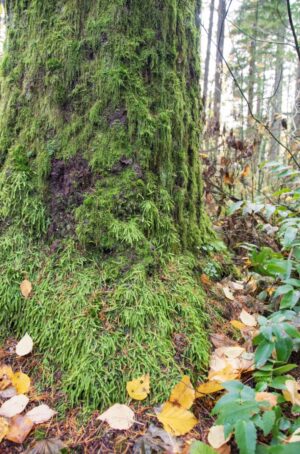 Improvements are coming to the Ancient Forest, one hour east of Prince George. The Enhancement Project is funded through the Investing in Canada Infrastructure Program – Community, Culture, and Recreation Program, with a total project cost of approximately $8.7 million. The Ancient Forest Provincial Park, known as Chun T’oh Whudujut in the Dakelh language, is one of the world’s few inland temperate rainforests, and was saved from logging in 2005… The project was originally funded in late 2019, and was expected to be finished by March of this year. However, it faced significant delays due to the COVID-19 pandemic in 2020, which disrupted planning and operations. This was followed by the tragic loss of both the Project Coordinator and Project Manager due to cancer, resulting in a loss of leadership and continuity.
Improvements are coming to the Ancient Forest, one hour east of Prince George. The Enhancement Project is funded through the Investing in Canada Infrastructure Program – Community, Culture, and Recreation Program, with a total project cost of approximately $8.7 million. The Ancient Forest Provincial Park, known as Chun T’oh Whudujut in the Dakelh language, is one of the world’s few inland temperate rainforests, and was saved from logging in 2005… The project was originally funded in late 2019, and was expected to be finished by March of this year. However, it faced significant delays due to the COVID-19 pandemic in 2020, which disrupted planning and operations. This was followed by the tragic loss of both the Project Coordinator and Project Manager due to cancer, resulting in a loss of leadership and continuity.
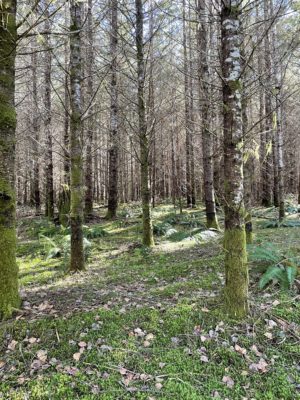 Is the Alberta government hell-bent on eliminating what remains of the two caribou herds that live in the mountains just north of Jasper National Park? Looking at the province’s recently released draft management plan for the Upper Smoky area, one might think that is the case. Let’s set this up: the motivation behind the sub-regional plan in the first place was to convince the federal government that the province was doing a good job of caribou conservation. Spoiler alert: they haven’t! Meanwhile, I can’t help but think of the irony that… the company which stands to benefit the most is a US-based forestry corporation, Weyerhaeuser. …For decades now, provincial governments have been promising to conserve and rehabilitate caribou habitat. And for decades, those governments have not made good on those promises. As discussed in previous Jasper Local articles, for caribou to have a chance, they need some space.
Is the Alberta government hell-bent on eliminating what remains of the two caribou herds that live in the mountains just north of Jasper National Park? Looking at the province’s recently released draft management plan for the Upper Smoky area, one might think that is the case. Let’s set this up: the motivation behind the sub-regional plan in the first place was to convince the federal government that the province was doing a good job of caribou conservation. Spoiler alert: they haven’t! Meanwhile, I can’t help but think of the irony that… the company which stands to benefit the most is a US-based forestry corporation, Weyerhaeuser. …For decades now, provincial governments have been promising to conserve and rehabilitate caribou habitat. And for decades, those governments have not made good on those promises. As discussed in previous Jasper Local articles, for caribou to have a chance, they need some space.
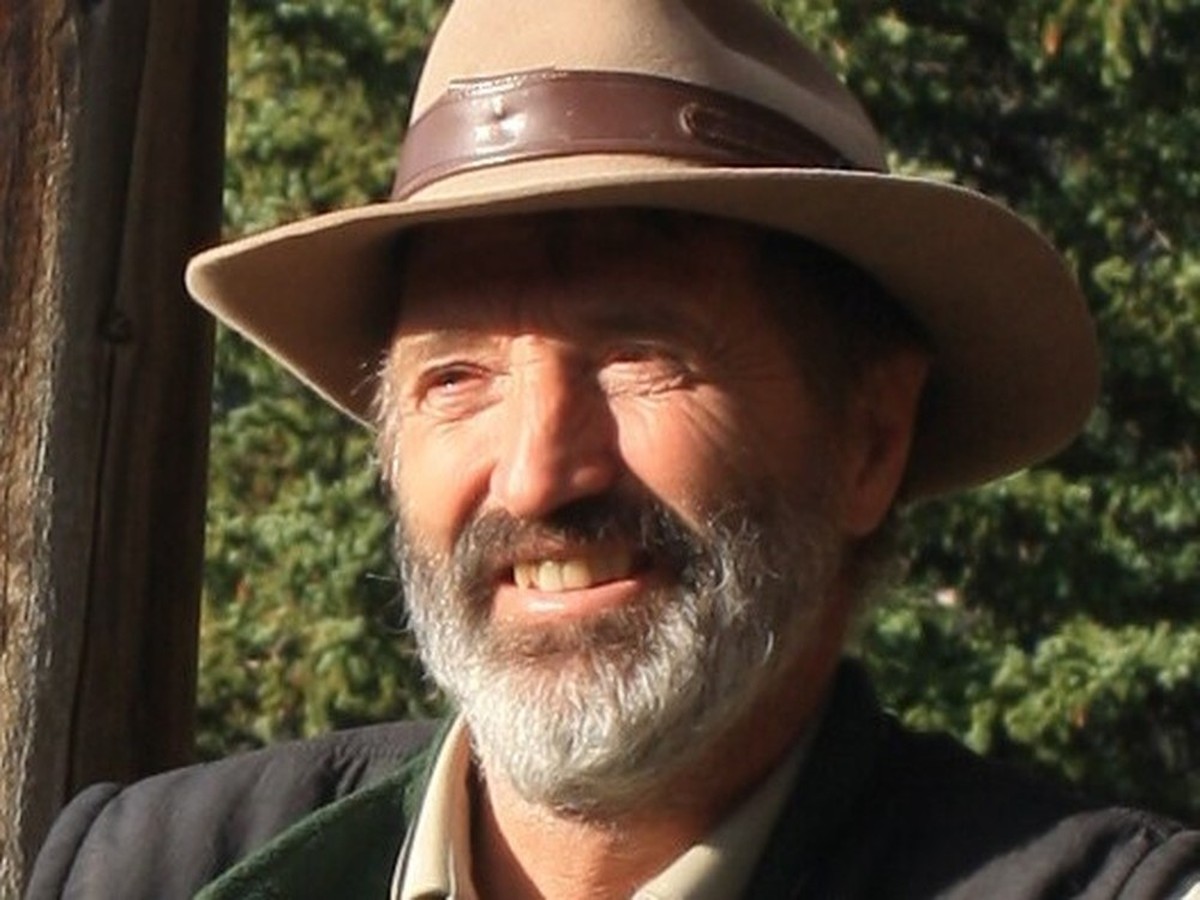
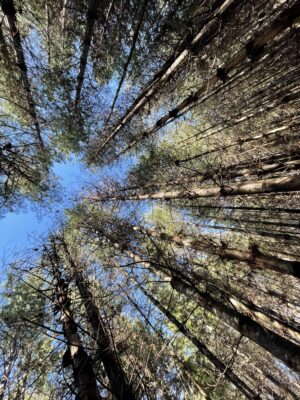 SUNDRE – While the persistent, multi-year presence of a destructive pest known as spruce budworm has been noted by Alberta Forestry and Parks, an entomologist for the provincial government said the localized impact is not yet considered an epidemic. “We mapped some minor infestations that are on private land south of the Sundre area,” said Forest Health Specialist Caroline Whitehouse. …“From what we’re seeing from our aerial overview surveys – that’s the primary way that we are doing monitoring for spruce budworm – we’re not seeing what we would call an epidemic at this point,” she said. …Asked whether there are any regions in the province where there might be an epidemic unfolding, she said the department’s data from 2024 does not indicate as much. …Steve Bouchet, owner of Everblue Nursery said he is less worried about his own tree farm. …“But it’s also a forest fire risk.
SUNDRE – While the persistent, multi-year presence of a destructive pest known as spruce budworm has been noted by Alberta Forestry and Parks, an entomologist for the provincial government said the localized impact is not yet considered an epidemic. “We mapped some minor infestations that are on private land south of the Sundre area,” said Forest Health Specialist Caroline Whitehouse. …“From what we’re seeing from our aerial overview surveys – that’s the primary way that we are doing monitoring for spruce budworm – we’re not seeing what we would call an epidemic at this point,” she said. …Asked whether there are any regions in the province where there might be an epidemic unfolding, she said the department’s data from 2024 does not indicate as much. …Steve Bouchet, owner of Everblue Nursery said he is less worried about his own tree farm. …“But it’s also a forest fire risk. They’re common subjects of news stories and interaction with humans and urban areas. But how common is the black bear in B.C.? Wildlife advocates say the answer is far from clear, and better data is required to help and understand the species, many of whom are destroyed as a result of becoming habituated to human food. “I want some more pressure on the government to address this big knowledge gap that we just don’t know how many we have,” said registered professional biologist Helen Davis with Artemis Wildlife Consultants. “We don’t know if we’re hunting too many, if we’re killing too many through conflict.” …Biologists like Davis, who, along with First Nations, want bear dens in old-growth forests protected with provincewide legislation, say there could be a misconception that a key species with ecological and cultural value is plentiful when the data to support that is outdated or even dubious.
They’re common subjects of news stories and interaction with humans and urban areas. But how common is the black bear in B.C.? Wildlife advocates say the answer is far from clear, and better data is required to help and understand the species, many of whom are destroyed as a result of becoming habituated to human food. “I want some more pressure on the government to address this big knowledge gap that we just don’t know how many we have,” said registered professional biologist Helen Davis with Artemis Wildlife Consultants. “We don’t know if we’re hunting too many, if we’re killing too many through conflict.” …Biologists like Davis, who, along with First Nations, want bear dens in old-growth forests protected with provincewide legislation, say there could be a misconception that a key species with ecological and cultural value is plentiful when the data to support that is outdated or even dubious. With fire season arriving earlier and burning longer each year, Whistler is pushing forward with a suite of new wildfire risk mitigation measures—ranging from forest fuel-thinning and emergency planning to updated bylaws and collaborative research. At the heart of the work is a recognition wildfires are no longer rare events, but a growing threat made worse by climate change. “We are acutely aware that the wildfire risk is rising in Whistler and it’s the single biggest climate change related risk and vulnerability for all of us here,” said the Resort Municipality of Whistler’s (RMOW) manager of climate and environment Luisa Burhenne at the May 13 council meeting. The RMOW has treated more than 100 hectares of high-risk forest, representing about one-third of its 2030 target.
With fire season arriving earlier and burning longer each year, Whistler is pushing forward with a suite of new wildfire risk mitigation measures—ranging from forest fuel-thinning and emergency planning to updated bylaws and collaborative research. At the heart of the work is a recognition wildfires are no longer rare events, but a growing threat made worse by climate change. “We are acutely aware that the wildfire risk is rising in Whistler and it’s the single biggest climate change related risk and vulnerability for all of us here,” said the Resort Municipality of Whistler’s (RMOW) manager of climate and environment Luisa Burhenne at the May 13 council meeting. The RMOW has treated more than 100 hectares of high-risk forest, representing about one-third of its 2030 target.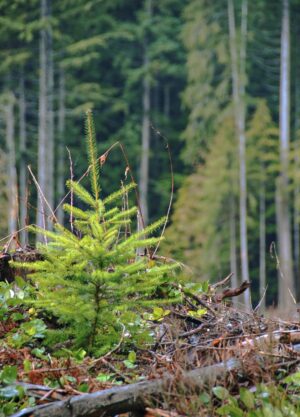 While the persistent, multi-year presence of a destructive pest known as spruce budworm has been noted by Alberta Forestry and Parks, an entomologist for the provincial government said the localized impact is not yet considered an epidemic. “We mapped some minor infestations that are on private land south of the Sundre area,” said Forest Health Specialist Caroline Whitehouse. “That kind of extends along that narrow band of spruce between the public forest and private land all the way west of Diamond Valley,” Whitehouse said. “And then it does peak into the Kananaskis forest area a little bit, but it’s really quite minor in that region”… Steve Bouchet, owner of Everblue Nursery who first established a plantation near Sundre in 1996, said he is less worried about his own tree farm where he can deploy mitigation strategies to attack the aggressive pest but harbours concern about damage trees in the greater area could suffer.
While the persistent, multi-year presence of a destructive pest known as spruce budworm has been noted by Alberta Forestry and Parks, an entomologist for the provincial government said the localized impact is not yet considered an epidemic. “We mapped some minor infestations that are on private land south of the Sundre area,” said Forest Health Specialist Caroline Whitehouse. “That kind of extends along that narrow band of spruce between the public forest and private land all the way west of Diamond Valley,” Whitehouse said. “And then it does peak into the Kananaskis forest area a little bit, but it’s really quite minor in that region”… Steve Bouchet, owner of Everblue Nursery who first established a plantation near Sundre in 1996, said he is less worried about his own tree farm where he can deploy mitigation strategies to attack the aggressive pest but harbours concern about damage trees in the greater area could suffer.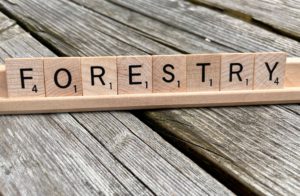


 In this edition of the WorkSafeBC Health and Safety News you’ll find:
In this edition of the WorkSafeBC Health and Safety News you’ll find: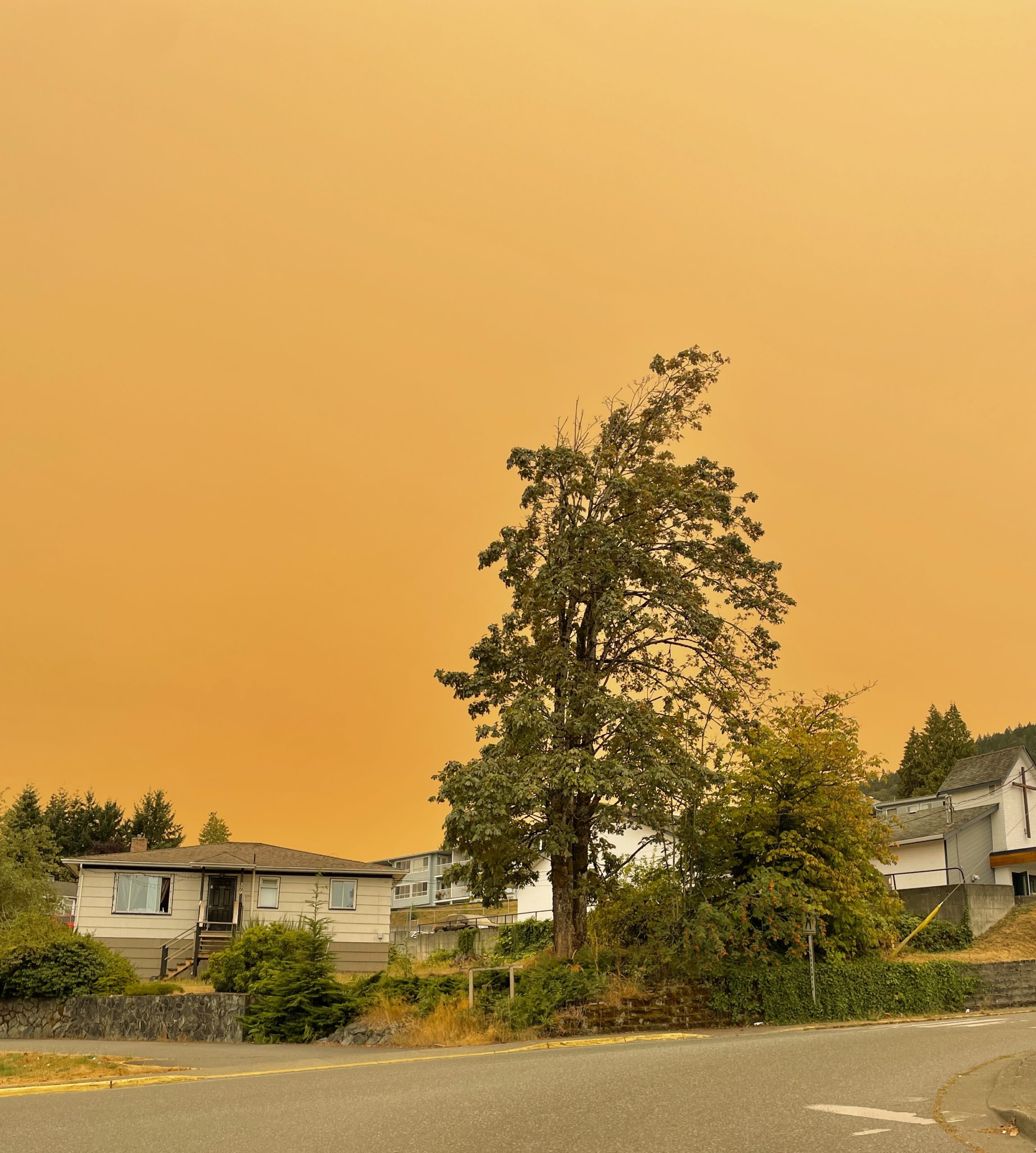 A drop in temperatures and some precipitation has reduced the fire hazard in the region, prompting an evacuation alert in the Northwest to be lifted. On Sunday, the Ministry of Natural Resources and Forestry (MNRF) lifted an evacuation alert issued last week for the Fort Frances District. The alert was implemented due to a 3,500-hectare fire burning south of Atikokan. There has been no growth observed in that fire for several days and precipitation and cooler weather has reduced fire behaviour. An evacuation order remains in effect for an area northwest of Kenora near the Ontario and Manitoba border due to the wildfire designated Kenora 20. It is a 400-square-kilometre fire burning south of Wabaseemoong First Nation that is not considered under control. The community of Wabaseemoong First Nation was evacuated late last week and structural protection efforts remain ongoing.
A drop in temperatures and some precipitation has reduced the fire hazard in the region, prompting an evacuation alert in the Northwest to be lifted. On Sunday, the Ministry of Natural Resources and Forestry (MNRF) lifted an evacuation alert issued last week for the Fort Frances District. The alert was implemented due to a 3,500-hectare fire burning south of Atikokan. There has been no growth observed in that fire for several days and precipitation and cooler weather has reduced fire behaviour. An evacuation order remains in effect for an area northwest of Kenora near the Ontario and Manitoba border due to the wildfire designated Kenora 20. It is a 400-square-kilometre fire burning south of Wabaseemoong First Nation that is not considered under control. The community of Wabaseemoong First Nation was evacuated late last week and structural protection efforts remain ongoing.